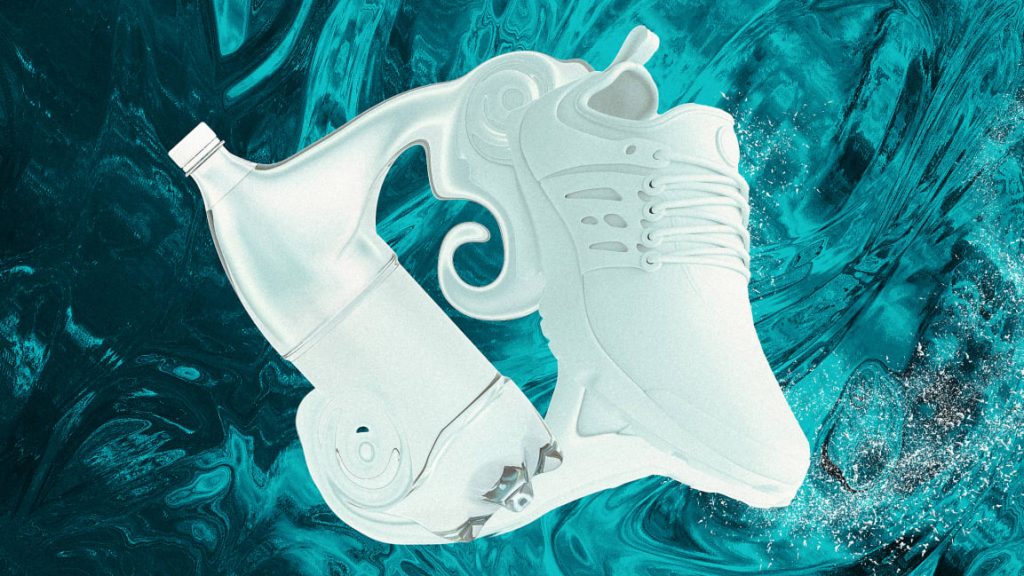I’m sorry to bum you out, but, yes, even your recycled plastic puffer is harming the planet. Over the past few years, recycled plastic has started showing up everywhere, from sneakers to garden furniture to kitchenware to clothing, as companies learned to reuse plastic from discarded water bottles. And it’s true that recycled plastic is better than new, petroleum-based plastic. But here’s the thing: Every time you wash or wear that puffer, microscopic particles of plastic are released into the water stream, poisoning fish—and when you finally throw it out, it will not biodegrade.
Pangaia, a two-year-old fashion brand focused on material innovation, is on a mission to find an alternative to recycled plastic. For decades, fashion brands have relied on plastic because it is cheap and easy to manufacture. But they are increasingly aware that they are drowning the world in plastic: It’s clogging up our landfills and filling up our oceans at a rate of a truckload a minute.
Today, Pangaia announces a partnership with tech startup Kintra which has invented a fabric that mimics the stretch, durability, and moisture-wicking properties of synthetics but is made of renewable materials and can be composted. So in theory, when you’re done with your parka, you can stick it in your compost bin and then use it to fertilize your flowers. The technology is still emerging and it’s unclear exactly how the fabric will perform, but it’s an encouraging sign that tech solutions might bridge the gap between the convenience of plastic and the environmental benefits of a biodegradable material.
Consumer goods have a serious problem with plastic. When the material was first widely used in the 1950s, designers saw it as a cheap, magical substance that could morph into whatever they wanted. Companies across the spectrum—from furniture makers to toy brands to food packaging manufacturers—have relied heavily on it since.
The fashion industry has been one of the biggest consumers of plastic. Nylon was first developed in the 1930s, but nearly a century later, 60% of the 100 billion garments churned out by the industry annually are made from synthetic plastic fibers, such as nylon, polyester, and spandex.
These materials are bad for the planet for many reasons. They’re largely made from petroleum, a nonrenewable resource, the extraction of which harms both humans and the planet. They also don’t biodegrade. In the 1970s, scientists discovered that synthetic fibers also shed tiny particles into the environment every time you wear it and even more when you wash it. Researchers at the University of California Santa Barbara found that synthetic fleece jackets release 1.7 grams of microfibers into each wash, and 40% of that ends up in rivers, lakes, and oceans, where it ultimately poisons marine animals and people.
Over the past few years, brands have tried to take on the plastic problem by replacing new plastic with recycled plastic. Adidas uses plastic fished out of the ocean to make shoes and activewear. Reformation and Everlane began using plastic recycled from old fishing nets and water bottles in swimsuits and garments, respectively. Pangaia used recycled plastic in its new FLWRDWN puffer collection. These efforts are an improvement on the status quo, because they have a lower carbon footprint and don’t rely on petroleum. But recycled plastics are not a silver bullet. They still shed microfibers and will likely ultimately end up in a landfill.
Jacqueline Savitz, chief policy officer for the ocean conservancy Oceana, worries the boom in recycled clothing may actually have a negative impact on the planet because they make consumers feel like they can use plastic with abandon. “People can feel good about using a plastic bottle because it would somehow get turned into a fleece,” she says. In truth, she points out, 91% of plastic is not recycled, and a lot of what we throw into our curbside recycling bins doesn’t ultimately get recycled for because they are contaminated with food or coated with plastic. “The solution is to move away from plastic altogether. It’s really doable: Society survived perfectly well without plastic until the 1950s.”
Savitz says that it is incumbent on companies to switch away from plastic-based materials. Consumers can’t really drive this change because they don’t have much choice in what they can buy at the moment. “The consumer has very limited choices,” she says. “It’s really up to consumer goods companies to provide us with alternatives so that we can choose the non-plastic option.
This is precisely what Pangaia is trying to do. Dr Amanda Parkes, the company’s chief innovation officer, received her PhD from MIT’s Media Lab and has been working for years to find an alternative to plastic-based fibers. What attracted her to Kintra’s material is that it is not trying to replicate the molecular structure of plastic, which is what makes it non-biodegradable. Instead, the company is creating a new compostable material that happens to have similar qualities to plastic.
Other companies have found ways to make plastic polymers from plants, rather than oil. Allbirds, for instance, started making the foam of its shoes from sugar. Flip-flop brand Tidal makes sandals from castor seeds. But while the raw materials for this plastic are renewable, the end result is not biodegradable. Billy McCall, Kintra’s CEO, says that it is doing something very different from these other companies. “It’s not plastic,” says McCall. “It has its own vibe and qualities. When you touch it, it feels far softer than most synthetics.”

